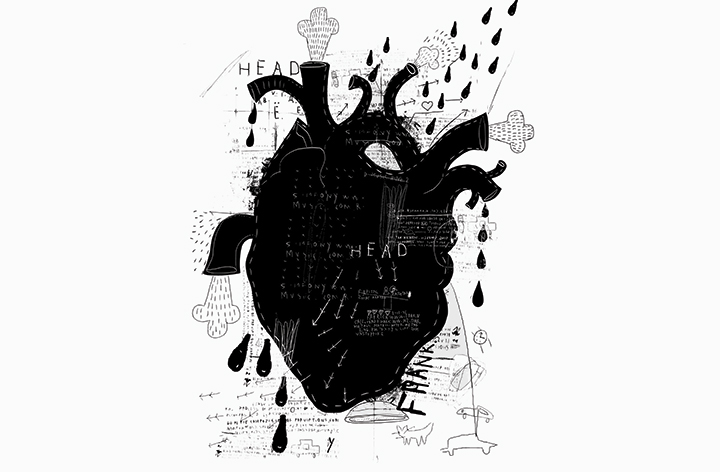BY MATT SALIS
It is hard to feel sorry for myself for my feelings of helplessness and inadequacy in the face of the pandemic. My family is safe and healthy, and my income has suffered only minor disruption (the nice thing about being a writer is that it’s hard for publishers to pay you less than they already do). Some families are dealing with illness and death. Other families have transitioned at a whiplash-inducing pace from solid employment and financial security to questions about where they’ll find their next meal. Given the alternative, my fear and weakness is hardly worth wringing my hands about.
Still, doing my part in this global health crisis feels like it should involve more than introducing my kids to my 1980s hair bands cassette tape collection and actually paying attention when my wife asks my opinion about the color she wants to paint her office. Social distancing, staying home except trips for groceries and a little exercise don’t feel like enough of an effort to defeat the threat that has the potential to impose losses on us not seen since World War II. I’ve learned two things in the past two months: Without medical training or experience in logistics, I’m as useful as bird poop on a pump handle during a pandemic. Also, wearing a face covering when out in public has convinced me that I need to consume more breath mints.
I’ve also learned, alongside most Americans, that with COVID-19, the factor that determines life and death is quite often the availability of a ventilator. And I’ve learned that when every country in the world is in short supply of the same life-saving piece of equipment, there simply won’t be enough to go around. And if there aren’t enough ventilators to go around, people will die who could otherwise have been saved. It has been said often that we are battling a war against an invisible enemy, and the casualties are tragic and agonizing.
Rationing of healthcare is something politicians threaten to scare us into agreeing with their points of view. It is certainly nothing I ever thought I would see in America. Not in the greatest, most powerful country on earth. Then I learned that rationing of healthcare is something we were experiencing in the United States well before the pandemic. In fact, 20 Americans die everyday because we don’t have what we need to save them.
When hospitals around this country began the necessary moral and ethical discussions around rationing of ventilators, they had a roadmap to lead their decision making and protocols. We already ration organs in the U.S. because only 60% of our population has registered to donate. That means two in every five people refuse to give life to another once their time has passed. That number is inconceivable to me, so I did a little more research.
The number of transplants performed in the U.S. grows every year, and so does the total number of donors. But the number of people on the list waiting for transplants grows annually at a much faster clip. The graph of the transplant list resembles the coronavirus curve without social distancing, for a visual with which we are all familiar. In 1991, there were just over 23,000 people waiting for organ transplants. There are currently over 112,000 people waiting. And 40% of a population of 325 million people aren’t interested in flattening that curve?
The coronavirus pandemic is unlike anything we’ve ever experienced, and it will leave death and societal trauma in its wake for us to contend with for years to come. But when it’s over, when we’ve mourned our losses and tabulated the lessons learned, there will still be 20 people dying everyday because the organs they needed for survival weren’t available.
In Colorado, we are blessed with a tremendous nonprofit organization named Donor Alliance that works on public awareness, donor family support and coordinates with the National Organ Procurement and Transplantation Network. This is an organization I’ve worked with personally for years, and they are good people doing great work to end the need for rationed healthcare.
And their efforts are having an impact, 69% of Coloradans are registered as organ donors, a full nine percent more than the national average. Pull out your driver’s license right now and verify that you are one. Nine points above average is something in which to take pride, but Donor Alliance won’t rest until that number is 100%.
In addition to awareness activities, Donor Alliance focusses a lot of their attention on providing comfort to the families of organ donors. They serve as a communications bridge to protect the anonymity of donor families and recipients in the very common case that they want to reach out and communicate with each other. They provide grief services, and have a variety of portals of connection to help donor families and recipients and their families through the process that requires both physical, and also emotional healing.
For more information, to ask questions or to make a donation, please visit their website at donoralliance.org.
If you are dealing with COVID-19 in your family, we are thinking about you and praying for you. If you work in healthcare or any of the other truly essential services, you are our heros, and we are in awe of you.
But if you’re like me, feeling helpless and a little bit hopeless, let’s do the simple things we can do to end healthcare rationing in this country: stay home to stop the spread, and make sure you are a registered organ donor.
Matt Salis writes, speaks, podcasts, directs a non-profit, leads an early sobriety program, coaches soccer at Denver South H.S. and runs (very slowly) around the crushed-gravel path that surrounds our beloved Wash Park a couple of times a week. Read more from Matt at SoberAndUnashamed.com.

